THE COMPLETE WORKS OF LUCIUS ANNAEUS SENECA
Edited by Elizabeth Asmis, Shadi Bartsch, and Martha C. Nussbaum
Seneca
Natural Questions
TRANSLATED BY HARRY M. HINE
The University of Chicago Press
CHICAGO AND LONDON
HARRY M. HINE is currently an Honorary Professor in the School of Classics at the University of St. Andrews, Scotland. From 1975 to 1985 he was a Lecturer in Humanity (i.e., Latin) at the University of Edinburgh, and from 1985 until his retirement in 2008 he was Scotstarvit Professor of Humanity at St. Andrews. His publications include commentaries on Senecas Natural Questions, Book 2, and on Senecas Medea, and a Teubner edition of the Natural Questions.
The University of Chicago Press, Chicago 60637
The University of Chicago Press, Ltd., London
2010 by The University of Chicago
All rights reserved. Published 2010
Printed in the United States of America
18 17 16 15 14 13 12 11 10 1 2 3 4 5
ISBN-13: 978-0-226-74838-2 (cloth)
ISBN-10: 0-226-74838-3 (cloth)
ISBN-13: 978-0-226-74854-2 (e-book)
Library of Congress Cataloging-in-Publication Data
Seneca, Lucius Annaeus, ca. 4 B.C.65 A.D.
[Naturales quaestiones. English]
Natural questions / Seneca ; translated by Harry M. Hine.
p. cm. (The complete works of Lucius Annaeus Seneca)
Includes bibliographical references and index.
The contents reflect the original order of composition of the books.
ISBN-13: 978-0-226-74838-2 (cloth : alk. paper)
ISBN-10: 0-226-74838-3 (cloth : alk. paper)
1. MeteorologyEarly works to 1800. 2. Science, Ancient. I. Hine, Harry M. II. Title. III. Series: Seneca, Lucius Annaeus, ca. 4 B.C.65 A.D. Works. English. 2010.
QC859.S4613 2010
551.5dc22
20090360009
 The paper used in this publication meets the minimum requirements of the American National Standard for Information SciencesPermanence of Paper for Printed Library Materials, ANSI Z39.48-1992.
The paper used in this publication meets the minimum requirements of the American National Standard for Information SciencesPermanence of Paper for Printed Library Materials, ANSI Z39.48-1992.
Acknowledgments
Most of the work on this introduction and translation was completed during a year of research leave granted by the University of St. Andrews, of which the second semester was funded by an award from the Arts and Humanities Research Council, for which I am most grateful. I also thank Shadi Bartsch for all her encouragement and advice; the presss two anonymous readers for their careful and helpful comments on the first draft, which resulted in many improvements to both introduction and translation; and my copy editor, Nicholas Murray, who suggested various further improvements. I am entirely responsible for any deficiencies that remain.
Seneca and His World
ELIZABETH ASMIS, SHADI BARTSCH, AND MARTHA C. NUSSBAUM
Seneca once remarked of Socrates that it was his death by hemlock that made him great (Letter 13.14). With reason: Socrates death demonstrated the steadfastness of his philosophical principles and his belief that death offered nothing to fear. When Seneca himself, then, was ordered to commit suicide by Nero in 65 CE, we might well believe Tacituss account in his Annals (15.63) that the Roman Stoic modeled his death on that of Socrates, discoursing calmly about philosophy with his friends as the blood drained out of his veins. In Tacituss depiction we see, for once, a much-criticized figure living up to the principles he preached.
Senecas life was mired in political advancement and disappointment, shaped by the effects of exile and return, and compromised by his relationship with the emperor Nerofirst his pupil, then his advisee, and finally his murderer. But his many writings say little about his political career and almost nothing about his relationship with Nero except for what can be gleaned from his essay On Clemency, leaving us to turn to later sources for informationTacitus, Suetonius, and Dio Cassius in particular. We know that Seneca was born to a prominent equestrian family in Corduba, Spain, some time between 4 and 1 BCE. He was the second of three sons of Helvia and Lucius Annaeus Seneca (the youngest son, Annaeus Mela, was the father of the poet Lucan). The elder Seneca had spent much of his life in Rome, and Seneca himself was brought to Rome as a young boy. There he was educated in rhetoric and later became a student of the philosopher Sextius. But his entry into political life was delayed, and when he did enter upon the cursus honorum late in Tiberiuss reign, his ill health (he had asthma and possibly tuberculosis) was a source of difficulty. In any case his career was cut short. He survived Caligulas hostility, which the sources tell us was thanks to his talents in oratory, but was sent into exile on Corsica by Claudius shortly after Caligulas death in 41 CE. The charge, almost certainly false, was adultery with Caligulas younger sister, Julia Livilla. Seneca spent his time in exile in philosophical and natural study and wrote the Consolations to Helvia (his mother) and to Polybius (Claudiuss freedman secretary), revealing in the latter how desperately he hoped to be recalled to Rome.
When Seneca did return in 49 CE, it was under different auspices. Claudius had recently remarried, to Germanicuss daughter Agrippina, and she urged him to recall Seneca as tutor to her son, the twelve-year-old Nero. Claudius already had a younger son, Britannicus, but it was clear that the wily Agrippina wished to see her own flesh and blood on the throne. When Claudius died five years later, Agrippina was able to maneuver Nero into position as emperorand Britannicus was dispatched by poison shortly after, in 55 CE.
From 54 until his influence waned at the end of the decade, Seneca acted as Neros advisor, together with the praetorian prefect Sextus Afranius Burrus. We know he wrote a speech on clemency for Nero to deliver to the Senate soon after his accession, and Senecas own essay On Clemency may contain some inkling of his strategy to keep the young emperor from running amok. Senecas use of the term rex, or king, applied to Nero by analogy in this piece, is surprising from a Roman senator, but he seems to have hoped that flattering Nero by pointing to his limitless power and the value of clemency would be one way to keep him from abusing that power. Both Seneca and Burrus also helped with the civil and judicial administration of the empire.
Many historians, ancient and modern, feel that this early part of Neros reign, moderated by Seneca and Burrus, represented a period of comparative good rule and harmony (the quinquennium Neronis). The decline started in 59 CE with Neros murder of Agrippina, after which Seneca wrote the emperors speech of self-exculpationperhaps the most famous example of how the philosopher found himself increasingly compromised in his position as Neros chief counsel. Certainly as a Stoic, Seneca cuts an ambiguous figure next to the others who made their opposition to Nero clear, such as Thrasea Paetus and Helvidius Priscus. His participation in court politics probably led him to believe that he could do more good from where he stood than by abandoning Nero to his own devicesif he even had this choice.
In any case, Senecas influence over Nero seems to have been considerably etiolated after the death of Burrus in 62. According to Tacitus, Seneca tried to retire from his position twice, in 62 and 64. Although Nero refused him on both occasions, Seneca seems to have largely absented himself from the court after 64. In 65 CE came the Pisonian conspiracy, a plot to kill Nero and replace him with the ringleader, C. Calpurnius Piso. Although Senecas nephew Lucan was implicated in this assassination attempt, Seneca himself was probably innocent. Nonetheless, Nero seized the opportunity to order his old advisor to kill himself. Seneca cut his own veins, but (so Tacitus tells us) his thinness and advanced age hindered the flow of blood. When a dose of poison also failed to kill him, he finally sat in a hot bath to make the blood flow faster. His wife, Pompeia Paulina, also tried to commit suicide but was saved on orders from Nero.
Next page
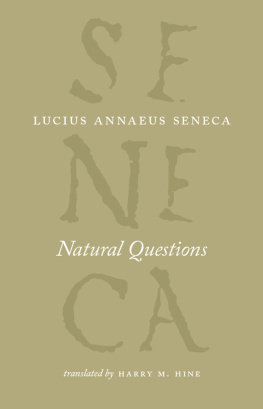
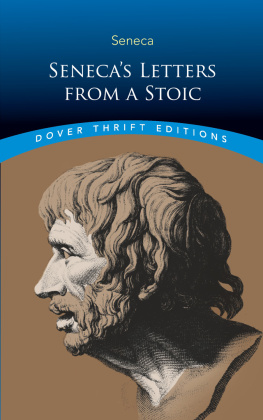
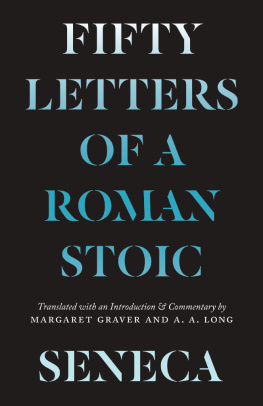

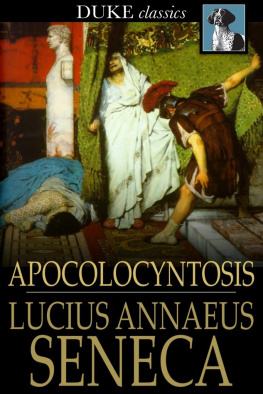

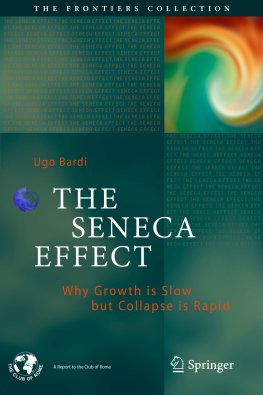
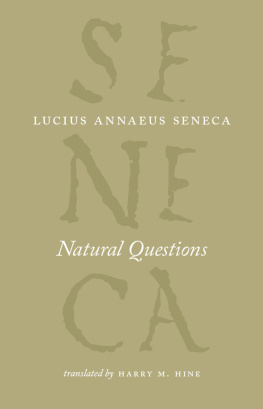
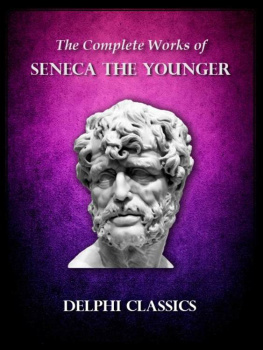
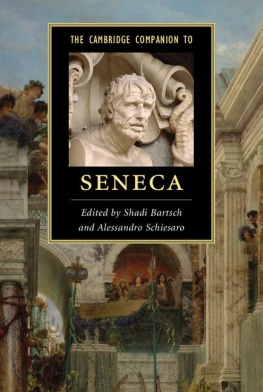
 The paper used in this publication meets the minimum requirements of the American National Standard for Information SciencesPermanence of Paper for Printed Library Materials, ANSI Z39.48-1992.
The paper used in this publication meets the minimum requirements of the American National Standard for Information SciencesPermanence of Paper for Printed Library Materials, ANSI Z39.48-1992.